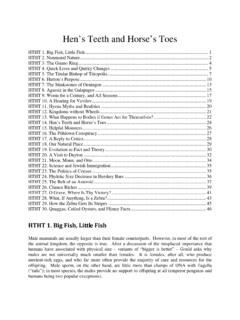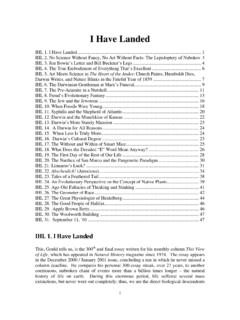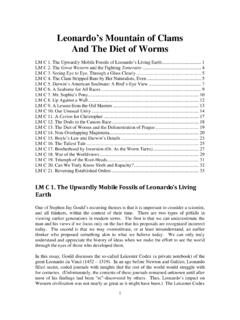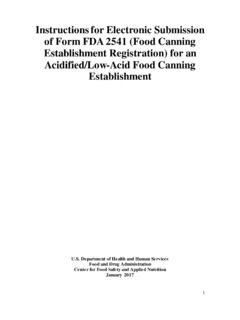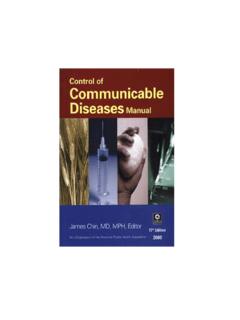Transcription of Bully for Brontosaurus
1 1 Bully for Brontosaurus BFB 1. George canning s Left Buttock and the Origin of Species .. 1 BFB 2. Grimm s Greatest Tale .. 2 BFB 3. The Creation Myths of Cooperstown .. 3 BFB 4. The Panda s Thumb of Technology .. 5 BFB 5. Bully for Brontosaurus .. 7 BFB 6. The Dinosaur Rip-off .. 8 BFB 7. Of Kiwi Eggs and the Liberty Bell .. 9 BFB 8. Male Nipples and Clitoral Ripples .. 10 BFB 9. Not Necessarily a Wing .. 12 BFB 10. The Case of the Creeping Fox Terrier Clone .. 14 BFB 11. Life s Little Joke .. 15 BFB 12. The Chain of Reason versus the Chain of Thumbs .. 17 BFB 13. Madame Jeanette .. 18 BFB 14. Red Wings in the Sunset .. 19 BFB 15. Petrus Camper s Angle .. 20 BFB 16. Literary Bias on the Slippery Slope .. 21 BFB 17. Glow, Big Glowworm .. 23 BFB 18. To Be a 24 BFB 19. Bligh s Bounty.
2 25 BFB 20. Here Goes Nothing .. 26 BFB 21. In a Jumbled Drawer .. 28 BFB 22. Kropotkin Was No Crackpot .. 29 BFB 23. Fleeming Jenkin Revisited .. 31 BFB 24. The Passion of Antoine Lavoisier .. 33 BFB 25. The Godfather of Disaster .. 35 BFB 26. Knight Takes Bishop? .. 37 BFB 27. Genesis and Geology .. 39 BFB 28. William Jennings Bryan s Last Campaign .. 40 BFB 29. Essay on a Pig Roast .. 41 BFB 30. Justice Scalia s Misunderstanding .. 44 BFB 31. The Streak of Streaks .. 45 BFB 32. The Median Isn t the Message .. 46 BFB 33. The Ant and the Plant .. 47 BFB 34. The Face of Miranda .. 48 BFB 35. The Horn of Triton .. 49 BFB 1. George canning s Left Buttock and the Origin of Species The subject of this essay is the contingency of history. George canning was a 19th century British politician, and a rival of one Lord Castlereagh.
3 Castlereagh, we are told, was the man who negotiated relatively generous terms with the fledgling United States 2 after the War of 1812 [as well as putting down the Irish rebellion of 1798, and helping to manage the coalition that defeated Napoleon]. Had canning been in office instead, Gould argues, would likely have implemented far harsher terms on the US, which would have led to continued animosity between the two nations (first and foremost, over Canada). He also argues that Andrew Jackson s career might have gone differently, despite his victory at New Orleans. A few years earlier, in 1809, canning and Castlereagh had fought a duel. canning was wounded in the buttock (and not the thigh, as is commonly reported), while Castlereagh was unscathed.
4 Had Castlereagh been killed in this duel, Gould argues, not only might British-US relations have taken a different course, but he would not have lived to meet a different fate in 1822 suicide. The relevance of this involves the fact that Lord Castlereagh s nephew was none other than Robert FitzRoy, the captain of the HMS Beagle during Darwin s 1831-36 voyage. Castlereagh suffered from melancholia (depression); FitzRoy was concerned that he was predisposed to this condition, which was recognized even then as hereditary. Gould argues that FitzRoy s fear of suffering a bout of this condition during the stressing role of commander no socialization allowed, even with officers caused him to bring along a member of the upper class as a friend, as was done occasionally during this period.
5 FitzRoy was also interested in beefing up the exploration aspect of his mission, which was nominally a geologic survey of the South American coast, to improve his own chances for advancement. Charles Darwin became this person; he was of the right class, and grandson of the famous thinker Erasmus Darwin. Thus, Darwin s presence on the Beagle was the result of a series of unlikely events, one of which was the survival of FitzRoy s uncle s dual with George canning . Gould adds that at this time, Darwin was not an evolutionist, and did not at all seem predisposed to become to become the man who would write Origin of Species. Gould does not argue that evolution via natural selection would not have been discovered anyway, although he does suggest that Darwin would likely have played no role in it had he not sailed on the Beagle.
6 The story would have been different, and history is all about details. Perhaps Jackson would have become President even if Castlereagh had died in 1809 and the US been humiliated after the Battle of New Orleans. The same argument can be applied to natural history, Gould believes. Were the outcomes of a few events just a bit different, there would be no humans today. [Gould discusses this latter theme in his 1989 book Wonderful Life.] BFB 2. Grimm s Greatest Tale Jacob Grimm (1785 1863) and Wilhelm Grimm (1786 1859), collectively known as the Brothers Grimm, are famous today for Grimm s Fairy Tales. The brothers did not write any of these Germanic fables, which include Snow White and Rapunzel, but rather collected and documented them.
7 While Wilhelm focused on cultural history, Jacob pursued the German language itself, publishing Deutsche Grammatik in 1819. This book discusses 19th-century German, but also the origin of the language as well; it is considered by many to be the first book in the field of linguistics, and documents many of the recently-discovered relationships between what has become known as the Indo-3 European languages. It includes Grimm s Law [now often referred to as Rask s-Grimm s rule], which discusses the sequence by which the German f - sound (pronounced in English as v ) was derived from the Latin (and pre-Latin) p - sound in many words. This and other similar rules indicate a path of descent that is in some ways analogous to biological evolution.
8 What motivated Gould to write this essay was a 1988 publication by L. L. Cavalli-Sforza, et al in Proceedings of the National Academy of Sciences that suggests that there may be more than linguistics to this similarity. The publication is entitled Reconstruction of Human Evolution: Bringing together Genetic, Archeological, and Linguistic Data. Cavalli-Sforza was a pioneer in using genetic analysis (primarily blood type and protein analysis in the 1960 s, as this predated modern gene sequencing techniques) to identify relationships among different peoples. Despite its greater age, scientists did not think that linguistics could play a role in determining the relationships and migration paths of human races, for two reasons.
9 The first was that it was generally believed that Homo sapiens evolved some 2 million years ago; language evolves so rapidly that the origins would surely have been lost to time. But more recent evidence, stemming in part from some of those genetic studies, suggested that we evolved only about 200,000 years ago, and first migrated out of Africa only 100,000 years ago. This, Gould argues, means that there is hope that linguistics may be able to play a role in deciphering human pre-history after all. The second reason scientists doubted the utility of applying linguistics to the problems of human evolution is that people move around so much, and intermarry wherever they go. Gould notes that he lives in the land where, 500 years ago, the local languages were a completely different phylum than that which contained English; further, English itself is a mixture of a Germanic language (from the Anglo-Saxons) and a Latin-derived language (from the Norman conquest in 1066).
10 In his personal case, he notes, his grandparents spoke Hungarian, which is itself non-Indo-European, and which is different yet again from Hebrew, which he presumes his more distant ancestors spoke. Yet despite this, one of the key factors of Cavalli- Sforza s paper is that, at least in places, there does appear to be a solid correlation between genetic groups and language groups. The exceptions are as interesting as well: Ethiopians, for example, are genetically African but linguistically Semitic. Gould does not know if this idea will prove valid, but notes that if it does, it could provide important additional information on our evolution and pre-history. BFB 3. The Creation Myths of Cooperstown This essay illustrates two interesting characteristics of the human mind.

